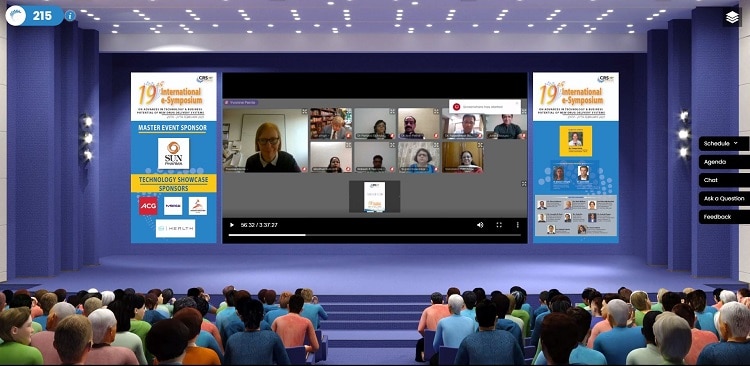CRS Indian Chapter organises international virtual symposium
The theme of the symposium was ‘Advances in Technology and Business Potential of New Drug Delivery Systems
The Controlled Release Society-Indian Chapter (CRS IC) organised its 19th International Symposium from February 25-27, 2021 on a virtual platform. The theme of the symposium was ‘Advances in Technology and Business Potential of New Drug Delivery Systems. This is a flagship event of CRSIC that is conducted every year in the month of February in Mumbai. This year since it was a virtual event, the symposium saw participation from postgraduate students, academicians, and Industry with more than 800 registrations. Researchers from across the country as well as from the US, Ireland, UK, Oman, Germany, UAE, Malaysia, Singapore, and Australia could also participate.
The Inaugural session started with virtual lamp lighting at the hands of Dr Yvonne Perrie Professor in Drug Delivery, University of Strathclyde, Scotland, UK and President, CRS, who was the Guest of Honour. This was followed by a welcome address and a brief talk on the activities of the Indian Local Chapter by the President of CRSIC, Dr Parizad Elchidana, Principal Technical Consultant – Pharma, ACG. Ajit Singh, Chairman ACG Worldwide, Ex-President and the patron member of CRS IC addressed the delegates regarding the importance of the research and novel drug delivery technologies in the advancement of the pharma sector. He also emphasised on the involvement of the pharma and allied industry in the activities of organizations like CRSIC. Dr Vandana Patravale, Professor of Pharmaceutics at Institute of Chemical Technology, Mumbai and Vice President of CRS IC and the editor of the Newsletter briefed the audience about the CRS IC e-Newsletter and the e-abstract book. They were formally released at the hands of Dr Perrie. The program was coordinated by Dr Madhur Kulkarni, Associate Professor and HOD-Pharmaceutics, SCES’s Indira College of Pharmacy, Pune and Secretary, CRS IC.
Dr Perrie gave a plenary talk on “Designing Delivery Systems for mRNA Vaccines”. The session was chaired by Dr Parizad Elchidana. Dr Perrie summarised the development of a self-amplifying mRNA vaccine encoding the rabies virus glycoprotein using non-viral delivery. Immunogenicity results demonstrated that both the administration route and delivery system format dictate self-amplifying RNA vaccine efficacy.
Dr Ijeoma Uchegbu, Professor of Pharmaceutical Nanoscience, UCL School of Pharmacy, University College, London, UK was the Keynote speaker of the second day. She delivered a presentation on “Pharmaceutical Nanotechnology and Drug Development”. Dr Justin Hanes, Professor and Director of the Centre for Nanomedicine at the John Hopkins University, US and Immediate Past President CRS was a Keynote speaker on the third day. He presented on “Drug Delivery to the Eye: From Concept to Clinical Success”.
The other invited speakers included Dr Mark Wilcox who is currently a Professor and Research Director at the School of Optometry and Vision Science, UNSW, Australia. He enlightened the audience on “Developing New Antimicrobial Coatings and Disinfectants for the Fight against COVID-19.” Dr Rakesh Tekade, Associate Professor, NIPER, Ahmedabad spoke on ‘Hybridized Dendritic Technology for the Delivery of SiRNA Therapeutics.’
The second-day sessions started with an outstanding presentation of Prof. Marcelle Machluff, Dean, Technion- Israel Institute of Technology, Israel. She talked about a novel topic “Nanoghosts: A New Paradigm in the Drug Delivery Field”.
Dr Cornelia Keck, Prof. of Pharmaceutics and Biopharmaceutics at The Philipps- Universitat Marburg, Germany presented a session on “Fostering the Dermal and Transdermal Penetration of Active Compounds with Nanoparticles – Fascinating New Insight”.
Dr Sara Cordeiro, Senior Lecturer in Pharmaceutical Sciences, Leicester School of Pharmacy, De Montfort University, UK spoke on “Microarray Patches for Transdermal Drug Delivery and Diagnostic Approaches”.
The scientific programs on both day 1 and 2 were followed by the Student Mentorship Session. The panel of mentors included a few speakers and representations from CRSIC.
On the third and final day of the Symposium, Dr Amirali Popat, Director of Research at the University of Queensland’s School of Pharmacy & President- CRS Australia presented on the topic, “Emerging Trends in Stimuli-Responsive Oral Drug Delivery”.
Dr Andy De, Senior Director, Healthcare and Life Sciences Industry Solutions, Texas, USA delivered a session on “The Impact of Artificial Intelligence (AI) and Analytics in Healthcare in the Emerging Post-Pandemic New Normal”.
Dr Kiran Krishnan, Senior Vice President, Global Regulatory Affairs, Apotex Corp., USA addressed the session entitled “Regulatory Considerations and Challenges with Nanoparticle-Based Drug Delivery Systems”.
Dr B Suresh Pro Chancellor, JSS Academy of Higher Education & Research, Mysuru was invited as the chief guest of the valedictory function. The best poster presenter, Ahana Banerjee, PhD student at Indian Institute of Technology Delhi was given the Young Scientist Award instituted by Dr Bhalla. The candidate will also be representing her research at CRS on “Co-Delivery of Chx/Pdgf From Layered Hydrogel Scaffold for the Regulation of Diabetic Wound Microenvironment”.
The first, second and third prize of the poster presentation was also given away at the hands of Dr Suresh.
66 e-posters along with the video presentations were made available for viewing throughout the three days of the symposium. The delegates had an opportunity to have live online interaction with the poster presenters during these three days.
The Student mentorship sessions of the symposium saw speakers mentoring young researchers on various aspects of research methodology.
One more unique feature of this symposium included the “Go Green Drive to Save Planet” adapted by CRSIC. As a part of this drive, each invited speaker at the symposium was presented with a “Go Green Certificate” and a tree would be planted on behalf of each invited speaker at Tatyasaheb Kore College of Pharmacy, Kolhapur. The trees would be the epitome of the ever-lasting bond between the speakers and the CRS IC.
The symposium were supported by partners from pharma and allied industries such as Sun Pharma, Merck, Arihant Innochem, Lubrizol Lifesciences, ACG, Ashland and Abitech Corporation
- Advertisement -



Channel manager api for pms lets you connect your software request to channel manager, which allows to provide channel management services to your existing customers.